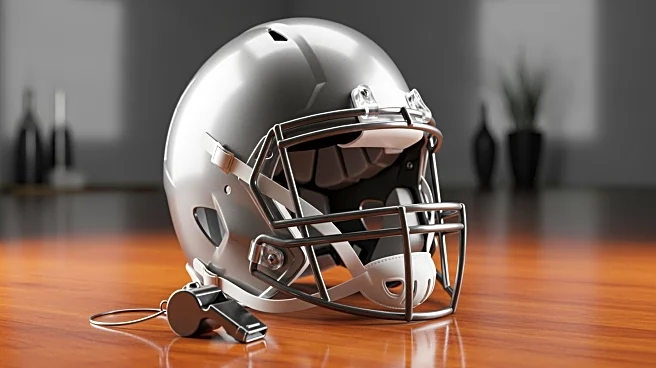What's Happening?
Denver Broncos running back J.K. Dobbins has publicly criticized the NFL following a foot injury sustained during a game against the Las Vegas Raiders. The injury occurred due to a hip-drop tackle executed by Raiders defensive end Tyree Wilson. Despite
the tackle, Dobbins managed to finish the game, recording 18 carries for 77 yards. The NFL had previously banned the swivel hip-drop tackle before the 2024 season, defining it as a maneuver where a defender grabs the runner and drops their hips, potentially trapping the runner's legs. Dobbins is now awaiting further medical evaluation, raising concerns for the Broncos, who hope he can maintain his health after previous knee injuries.
Why It's Important?
The incident highlights ongoing debates within the NFL regarding player safety and the effectiveness of rule changes. Hip-drop tackles have been controversial due to their potential to cause serious injuries, prompting the league to ban them. Dobbins' injury and subsequent criticism underscore the challenges in enforcing these rules and ensuring player safety. The Broncos, currently performing well in the season, face uncertainty regarding Dobbins' health, which could impact their strategy and performance. The situation also raises questions about the consistency of officiating and the clarity of rule definitions, affecting teams and players across the league.
What's Next?
The Broncos will focus on assessing Dobbins' health and determining his availability for upcoming games. If Dobbins is unable to play, rookie running back RJ Harvey may see increased playing time. The NFL may face pressure to review and possibly refine the rules surrounding hip-drop tackles to prevent future injuries. Teams and players might advocate for clearer guidelines and stricter enforcement to enhance safety. The league's response to Dobbins' criticism could influence future policy decisions and impact how similar incidents are handled.
Beyond the Headlines
The broader implications of this incident touch on the ethical responsibility of sports organizations to protect their athletes. The NFL's handling of player safety issues, such as hip-drop tackles, reflects on its commitment to maintaining a safe playing environment. This situation may prompt discussions on the balance between competitive play and player welfare, potentially leading to long-term changes in how the sport is regulated. The cultural impact of such injuries also affects public perception of the sport and its governance.

















